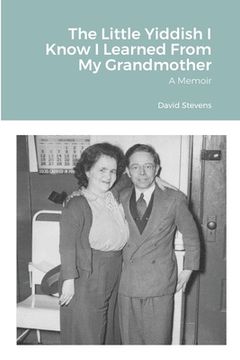Share
The Little Yiddish I Know I Learned From My Grandmother: A Memoir (in English)
David Stevens
(Author)
·
Lulu.com
· Paperback
The Little Yiddish I Know I Learned From My Grandmother: A Memoir (in English) - Stevens, David
$ 12.40
$ 14.72
You save: $ 2.32
Choose the list to add your product or create one New List
✓ Product added successfully to the Wishlist.
Go to My WishlistsIt will be shipped from our warehouse between
Monday, May 27 and
Tuesday, May 28.
You will receive it anywhere in United States between 1 and 3 business days after shipment.
Synopsis "The Little Yiddish I Know I Learned From My Grandmother: A Memoir (in English)"
David Stevens is a retired professor and attorney. This Memoir is a compilation of his blogs from 2009 to 2021. While not a complete autobiography, it presents a coherent picture of his life and family. As a secular Jew turned atheist, Stevens participates in both the alienation and integration of his people. While he could be said to have participated in the American Dream, rising from the working poor to the upper middle class through education, he also feels elements of an American nightmare, having been affected by alcoholism and domestic abuse. From the title essay: "My maternal grandmother, Etta Felger Brock, was born in Ukraine in 1905. Over the next ten years her entire family emigrated to America, eventually settling in Milwaukee. Her father, David Felger, went first alone in 1910. Etta's older sisters Fannie and Rose went next in 1913. In 1914 her mother Sylvia Stelnick Felger followed with Etta, her younger sister Katie, and her younger brother Morey (Moishe). They spoke mostly Yiddish at home, although they naturally spoke Ukrainian. They were close enough to Poland that they spoke fluent Polish as well. For political reasons they felt it wise also to speak Russian. In the long run it was a very good thing they left when they did; following World War II there were no Jews left alive in their village (Ustylúh), including the relatives who died because they would not or could not leave. In my imagination it looks like the end of 'Fiddler on the Roof', although I doubt there was any musical accompaniment or any turntable."
- 0% (0)
- 0% (0)
- 0% (0)
- 0% (0)
- 0% (0)
All books in our catalog are Original.
The book is written in English.
The binding of this edition is Paperback.
✓ Producto agregado correctamente al carro, Ir a Pagar.

